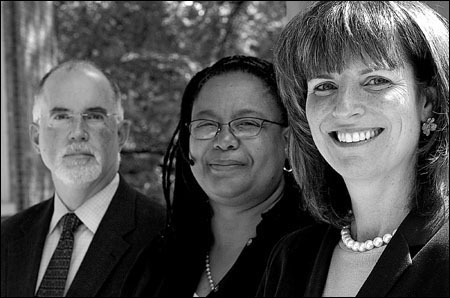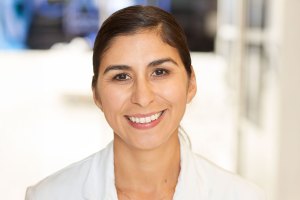Provost’s Office is restructured
Hyman makes changes to meet new challenges

Harvard, like universities throughout the country, is facing unprecedented change and new challenges brought about by the growth of new interdisciplinary fields, the explosion of information technology, the desire of students and faculty to engage globally, and a spate of new government regulations. In an effort to take advantage of the growing number of opportunities and to manage new risks, the Office of the Provost has undergone a strategic reorganization over the past several months.
“The intellectual landscape is being redefined,” said Provost Steven E. Hyman. “To accomplish the far-reaching goals of our faculties and encourage collaboration on a University-wide scale, it was essential to increase the capacity of the office.”


According to Hyman, the restructuring is also a response to suggestions of faculty and deans. “In discussions over the past year, one theme we heard repeated was the desire for better faculty representation in the administration, which has led to the appointment of several senior faculty members to serve as part-time vice-provosts.”
Created in 1992 to draw together the faculties of the University, the Office of the Provost has increasingly found itself confronted with “unforeseen demands and projects,” according to Linda Zedros, Hyman’s recently appointed chief of staff. “The office has always worked closely with faculty and administrative colleagues on such diverse topics as federal research policy, large-scale international projects, the mental health needs of students, as well as academic and financial planning,” she said.
“With the remarkable opportunity for expansion into Allston, the need to be more responsive to the faculty, and the increased regulation by government and scrutiny by other funders, re-examining the traditional role of the office was important.”
Over the past year, in recognition of the growing need for collaboration and coordination across the University, the Harvard Corporation asked University leadership to consider the scope and role of the Provost’s Office in the context of the changing needs of the University. As a part of the review, deans, faculty members, and administrators were interviewed and their advice compiled for discussion.
Concurrently, the Task Force on Women Faculty and the Task Force on Women in Science and Engineering recommended that the Provost’s Office assume responsibility for overseeing efforts to develop a more diverse faculty, specifically endorsing a senior position in the Provost’s Office to improve the recruitment and advancement of outstanding women and underrepresented minority faculty.
These deliberations resulted in several recommendations that necessitated a reassessment of the office’s current structure and additional appointments.
In addition, it was decided that the office should focus its energies on several priority areas. The office has been tasked with planning for the academic uses of Harvard’s Allston land, with a particular focus on science, arts and culture, and the professional Schools; supporting the development of large-scale, cross-disciplinary research and educational initiatives; improving the University’s capacity to recruit underrepresented groups, especially women and minorities, and to support the development of a pipeline that will yield faculty of the future; facilitating the renewal and development of the University’s museums and other cultural resources, both in Cambridge and Allston; developing policies to facilitate faculty research at a time of increased regulation and commitments to controversial areas such as stem cell research; ensuring that the University develop effective strategies for international research and education while remaining mindful of risks to faculty, students, and the institution; and facilitating the translation of faculty research into useful, marketable, and broadly beneficial technologies.
“I am enormously pleased with the level of accomplishment represented by new appointments,” said Hyman. “These are people who are outstanding in their fields with proven leadership abilities. I am confident that as we move into the future, their contributions will be crucial in guiding Harvard’s development and fulfilling its mission as a great research and teaching institution as well as an important resource for the communities of which it is privileged to be a part.”
The new appointments
Linda Zedros, chief of staff. Zedros, formerly director of administration at the School of Public Health’s Department of Health Policy and Management, replaces Sean Buffington. She will work with the provost on strategic issues, setting priorities, and overseeing the day-to-day management of the office.
Evelynn Hammonds, senior vice provost for faculty development and diversity. Hammonds, professor of the history of science and of African and African American Studies, will address the need for more systematic analysis and review of appointments, with an eye to ensuring greater excellence and diversity in faculty ranks across the University. She will also review junior faculty and other term appointments across the University, serve as an adviser to the president and provost in the tenure process, and oversee the administration of funds designated to facilitate appointments of outstanding scholars who increase faculty diversity. She will participate in the annual academic planning process chaired by the provost, develop annual reports on the status of diversity and development efforts across the University, and, in close collaboration with the faculty and School deans, focus on improving the climate for women and underrepresented racial and ethnic groups on campus.
Shawn Bohen, assistant provost for faculty development and diversity. Bohen, formerly executive director of the University’s Initiative for Global Health, will work closely with Evelynn Hammonds and colleagues across the University to implement the two sets of Task Force recommendations and related efforts aimed at enhancing existing policies, procedures, and practices to ensure commensurate progress on issues of gender equity and diversity across the University.
John Huchra, vice provost for research policy. Huchra, Doyle Professor of Cosmology in the Faculty of Arts and Sciences and senior astronomer at the Harvard-Smithsonian Center for Astrophysics, will work closely with the Office of Sponsored Research, the General Counsel’s Office, and the several School-based research offices; lead efforts to develop consistent University policies and practices in the area of research policy; represent the University in discussions and negotiations with outside funders; and chair – and in some cases create – University research policy committees. He will also advise the provost and president on research policy and practice.
Isaac Kohlberg, associate provost and chief technology development officer. Kohlberg, formerly chief executive officer of the Tel Aviv University Economic Corp. and CEO of its technology transfer organization, will oversee the development of new technologies based on discoveries made at Harvard.
Dan Moriarty, senior associate provost and chief Information officer, Moriatry is responsible for University-wide information technology efforts including core infrastructure, academic computing, and administrative systems. Major elements of the infrastructure include voice, networking, data center operations/enterprise systems hosting, desktop support, software licensing, and IT management services. Academic computing efforts include instructional computing support (iCommons tools and Presidential IT Fellows), promoting knowledge transfer via faculty conferences and events, and pedagogical innovation via an internal grant fund. Administrative systems include major enterprise applications in financial, human resources, grants management, data warehouse, and numerous boutique applications such as fundraising, real estate management, and facilities management.
Kathy Buckley, associate provost for science. Buckley works with the provost and the president in developing University-wide, interfaculty science-based initiatives, advising them on a wide variety of science policy issues. She also works with the senior management of the science departments on academic planning and budget processes in the Faculty of Arts and Sciences, Harvard Medical School, Harvard School of Dental Medicine, and the School of Public Health.
Doreen Koretz, associate provost for social sciences and professions. Koretz works on matters involving the social sciences and departments or Schools of public policy, law, education, and business. She manages cross-faculty initiatives in these areas and supports the development of new interfaculty projects. Koretz also works with senior management of the social sciences and related professional schools on academic and budget planning and various aspects of visitation and appointments for which the Provost’s office has responsibility.
Sean Buffington, associate provost for arts and culture, director of cultural programs. Buffington, formerly assistant provost and deputy chief of staff, will assume responsibility, along with an advisory committee and relevant department chairs and faculty leaders, for planning the cultural components of the Allston campus and identifying fundraising priorities in the arts and culture. He will also develop and support new cultural and artistic projects that enhance the education of Harvard students and make the cultural and artistic resources of Harvard more visible and accessible to the University and greater Boston communities.
Eric Buehrens, deputy provost for administration. Buehrens, formerly executive dean for administration at Harvard Medical School (HMS), will spearhead the University’s development of scientific research facilities for the planned Allston campus. Buehrens comes to his planning role with experience in supervising academic expansion. At HMS, he oversaw the design and construction of the New Research Building, a $260 million, 525,000-square-foot facility at the School’s Longwood campus, which opened in 2003.
Howard Stevenson, vice provost for planning and resources, Sarofim-Rock Professor of Business Administration, Harvard Business School. Stevenson advises the president, provost, and the vice president for Alumni Affairs and Development on all aspects of strategic planning for University fundraising initiatives. He also assists the deans of the Schools and their senior officers in crafting fundraising priorities based on academic and financial plans.




